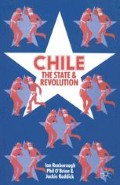Abstract
One should always be suspicious of people who draw cut and dried ‘lessons’, according to their own political formula, from the experiences of other countries and other times. ‘Men make history, but they do not make it just as they please; they do not make it under circumstances chosen by themselves, but under circumstances directly encountered, given and transmitted from the past. The tradition of all the dead generations weighs like a nightmare on the brain of the living …’1 Even the working class suffers from the weight of the traditions of its dead generations. Successful revolutions are made partly in spite of those dead generations, and partly by drawing on their accumulated strength. The task is never cut and dried: certainly it was not so in Chile.
Access this chapter
Tax calculation will be finalised at checkout
Purchases are for personal use only
Preview
Unable to display preview. Download preview PDF.
Notes
K. Marx, The Eighteenth Brumaire of Louis Bonaparte, Moscow, 1967, p. 10.
Copyright information
© 1977 Ian Roxborough, Philip O’Brien, Jackie Roddick
About this chapter
Cite this chapter
Roxborough, I., O’Brien, P., Roddick, J. (1977). Conclusions. In: Chile: The State and Revolution. Palgrave Macmillan, London. https://doi.org/10.1007/978-1-349-15715-0_11
Download citation
DOI: https://doi.org/10.1007/978-1-349-15715-0_11
Publisher Name: Palgrave Macmillan, London
Print ISBN: 978-0-333-19508-6
Online ISBN: 978-1-349-15715-0
eBook Packages: Palgrave Political & Intern. Studies CollectionPolitical Science and International Studies (R0)

